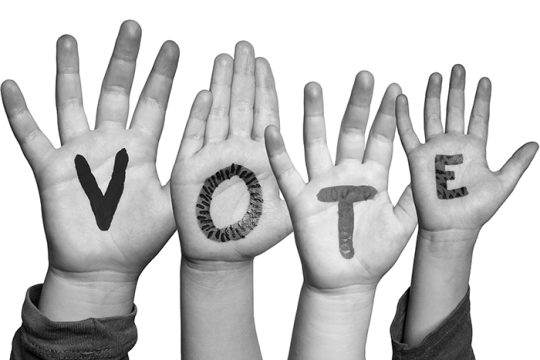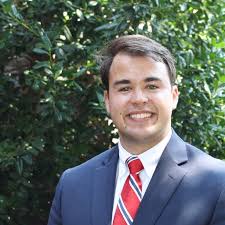This post is adapted from a sermon given at Temple B'nai Shalom in Fairfax Station, Virginia on January 12, 2018. Watch the full sermon.
On Erev Rosh Hashanah at Temple B'nai Shalom, Rabbi Amy Perlin spoke of the centrality of memory to her rabbinate and to this community. She said to the congregation:
“Memories are how we explain who we are today, in light of who we were once upon a time.”
So many of my sweetest Jewish memories come from this place, and from this community.
I remember shul-ins and Purim carnivals, right behind those folding walls. I remember hushed conversations in these hallways. I remember reflecting on the profound and reverberating silence of this sanctuary after returning the Torah on Tuesday nights during Hebrew School that countless students had been reading to practice the portions that would be part of their own b’nai mitzvah celebrations.
I remember sitting where my parents are sitting now for Shabbat services that would deeply move my family; I remember the hugs and kisses, the tears and laughter, that emanated from those seats.
I remember spending many years’ worth of my Tuesday nights in room 8 with Rabbi Perlin, where I was a madrich -- teaching the Jewish values I had learned in the same space to some of you here tonight; values on which I continue to rely today. I remember making the tallit here that I am wearing today.
I could go on. I am proud to carry within me the memories that are hidden within these walls; lessons and values that I use even today. As a legislative assistant at the Religious Action Center of Reform Judaism, I am honored to represent every one of you and the 1.5 million other Reform Jews in our nation’s halls of power. The RAC played and continues to play a significant role in our nation’s history. Both the Civil Rights Act of 1964 and the Voting Rights Act of 1965 were drafted in our conference rooms; as Reform Jews, we continue to fight for civil rights and equality for all as part of our tradition. My portfolio of legislative issues includes some of the areas in which the RAC has played an indispensable role on the national stage, including church-state issues, LGBTQ equality, hate crimes, civil liberties, and interfaith relations.
I see my Judaism wrapped up in social justice because of the values I learned here at Temple B'nai Shalom; because of the memories I carry forward with me from this place. It is here where I learned that as Jews we are commanded to welcome the stranger; that a caring community is about celebrating inclusion and diversity. I learned here, from my Jewish values book in Rabbi Perlin’s class, that peace in the world starts with shalom bayit, or peace in the home and in our own community.
It is here where I learned that our values compel us to go out into the world and speak truth to power; to advocate for policies that liberate rather than oppress, that unite rather than divide. It is here where I learned that as Jews we are compelled to fight against systems of oppression and all forms of bigotry, including racism, sexism, classism, homophobia, transphobia, Islamophobia, anti-Semitism, and xenophobia. I am proud to carry within me the TBS spirit: a spirit of Judaism rooted in values and a rigorous ethical commitment to truth. I took that spirit with me to college, where I served as president of the Hillel at Brown and the Rhode Island School of Design, and to the RAC, where I am today.
On this Shabbat and MLK Weekend, in which we pause as a community to reflect on our nation’s struggle toward justice, and as we read in Va-eira about the Israelites’ plight to escape from bondage in Egypt, I cannot help but think about the role of memory in the values that compel us as Jews to build a world of justice, wholeness, and compassion; the sort of work I am lucky to do in Washington every day, representing the movement in which I grew up: the movement that is wrapped up in the DNA of this very building.
And it is in this week’s parsha, or Torah portion, where we learn that memory unites not only a community like ours -- as Rabbi Perlin reminded us on Rosh Hashanah -- but also an entire tradition: the very tradition that we have inherited as Jews.
In Va’eira, we read part of the story we recount on Passover. In this portion, we read about many of the plagues that God -- through Moses -- inflicts upon Pharaoh and the Egyptian people in order to liberate the Israelites from bondage. This is part of the Passover story that we tell every year; it is likely very familiar to many of us.
Tonight, I want to reflect on three ideas we encounter in this week’s portion and in our practice of re-telling it through Passover every year.
First, we read that our ancestors are considered wanderers. God says to Moses of Abraham, Isaac, and Jacob in the beginning of the portion, “I...established My covenant with them, to give them the land of Canaan, the land in which they lived as sojourners” (Exodus 6:4). Our ancestors, we learn, were sojourners, or strangers, in their own land. The story of Passover is about the liberation of a people who were wanderers before they were enslaved, and who would go on to wander for 40 more years in the desert before arriving at the Promised Land after they were freed.
The story of Passover -- a story of triumph, the battle between good and evil -- starts with a story about a vulnerable people. Every Shabbat, we celebrate the triumph of our exodus from Egypt when we sing Miriam’s song -- Mi Chamochah -- a song of freedom. But our story of freedom starts with a reminder about who we once were. In the spirit of Rabbi Perlin’s words I shared earlier, memory helps us understand who we are today in light of who we were once upon a time. This week’s parsha reminds us that we cannot separate the blessings we count today -- our freedom -- from the bitterness of who we once were. We were delivered from bondage to a land of freedom by God: for us, freedom is inextricably linked to our experience with oppression. The word for Egypt in Hebrew even reminds us of this: Mitzrayim literally translates to English as “from a narrow place.” This narrowness can be understood in so many ways, including, perhaps, the narrowness of our ancestors’ existence as slaves: a bitter, small reality that would widen and open into something better, freer.
The second idea on which I want to reflect is how Pharaoh is described in this portion. We read, “The Eternal replied to Moses, ‘See, I place you in the role of God to Pharaoh, with your brother Aaron as your prophet. You shall repeat all that I command you, and your brother Aaron shall speak to Pharaoh to let the Israelites depart from his land. But I will harden Pharaoh’s heart, that I may multiply My signs and marvels in the land of Egypt.” (Exodus 7:1-3). Pharaoh, we read, is cold, callous, and indifferent. It is to him whom Moses and Aaron must speak truth to power. We learn, through this week’s portion, about what it takes to dismantle a system of power; to fight against a system of oppression. It is in this week’s parsha where we are reminded of our prophetic tradition: a tradition that challenges the status quo through moral clarity and conviction.
But, perhaps more important, is that we read that God compounds Pharaoh’s callousness. Pharaoh’s heart, which we read is stiff and hardened, is part of why the pleas of the Israelites go unheeded. The story of Pharaoh is just as important to our recollection of slavery as the story of Moses, Aaron, and Miriam. Pharaoh’s hardened, stiff heart reminds us of the deafening danger of indifference. Listening requires practice and compassion, Pharaoh reminds us. We all contain within ourselves the capacity to be like Pharaoh: cold, indifferent, calculating. The plight of our ancestors reminds us that we must lead with our heads and our hearts.
The third idea on which I want to reflect is our practice of re-telling the story we read in this week’s portion. We hear it at least twice a year: once when we read the Passover story during our weekly Shabbat services, as we will do tomorrow morning, and once when we recount it at our seder on Passover. We memorialize the story of Passover every year. We eat maror in order to remember the bitterness of slavery. It is an annual ritual of remembering our experience as slaves in Egypt.
This Shabbat, and on Passover when we read this story again, we remember that we were held in bondage. For this reason, we remember that just as we were liberated, we are committed to the liberation of all people. We remember, and so we forge ahead. As Jews, our justice work is rooted in memory.
It is in Exodus where we, as Jews, find our spiritual rooting to our commitment to make the world a more just place. It is in this week’s portion. As Rabbi Perlin said to us on Erev Rosh Hashanah,
“There is a quote from the great Chasidic rebbe, the Baal Shem Tov (1700-1766) on the entrance to Israel’s Yad Vashem: ‘Redemption lies in remembering.’ As Jews, our memories have saved us, and our collective memory of exile and persecution has demanded that we save others.”
It is this spiritual commitment to memory that undergirds the work I do and the work that so many of my colleagues do at the RAC. And there is so much work to do. The RAC maintains policy positions on over 70 issue areas. Every day, I fight against attempts to make the lives of LGBTQ Americans harder. On the federal level, sexual orientation and gender identity are still not protected categories in civil rights law. Transgender and gender non-conforming students still face school district policies that are unwelcoming and discriminatory around the nation, in the absence of federal protections. These are realities we are working to change. I also fight against others’ attempts to distort essential religious freedom protections; distortions that would make it easier to discriminate against women, people of color, religious minorities, members of the LGBTQ community, and others who hold marginalized identities.
As Jews, we remember the danger of hatred and bigotry. We learned in November from the FBI in its annual hate crimes report that the number of hate crimes increased in the United States in 2016 from its levels in 2015. Jews were the targets of 54 percent of religious-based hate crimes. Muslims faced a 19-percent increase in hate crimes between 2015 and 2016. Anti-transgender incidents increased by 48 percent.
This is a reality I am fighting to change as a Jew and as an American. These are not political or partisan issues. These are issues that reveal how we believe we ought to treat one another. These issues are personal to all of us: the Reform Movement is made up of Jews of color, LGBTQ Jews, and others who are personally affected by the reality of systemic discrimination.
These values compel us to fight for equality for all. We fight for all because we understand and remember the price of silence, indifference, and callousness. Working to protect the rights of all is essential to who we are as Jews. We should know that the story of Exodus has played an important role in liberation movements throughout human history, including the fight against slavery and for racial justice here in the United States. This long weekend, Martin Luther King, Jr. Weekend, is named for a man whose faith was a fundamental lens through which he fought for justice: a fight in which Jews were and remain proud allies and partners. It was a fight that did not end with the Civil Rights Act or the Voting Rights Act. As Dr. King wrote in Where Do We Go From Here: Chaos or Community?,
“With Selma and the Voting Rights Act one phase of development in the civil rights revolution came to an end. A new phase opened, but few observers realized it or were prepared for its implications.” When African-Americans, King continued, “looked for the second phase, the realization of equality, they found that many of their white allies had quietly disappeared…the absence of brutality and unregenerate evil is not the presence of justice. To stay murder is not the same thing as to ordain brotherhood.”
The work we do today to advance civil rights and equality for all is imbued with our commitment to realizing Dr. King’s vision and the vision of so many others. We know that the work is not yet done.
It is this reality -- the reality of enduring discrimination, bigotry, hatred, and injustice -- that makes the parsha this week about Pharaoh all the more important and meaningful. The story we read is alive today. We must welcome the wanderer -- the stranger -- because we were wanderers. We must fight against the ease with which we can close our hearts as individuals, as a community, and as a nation, to the pleas of others. And we must remember our own story in order to ground our work and our commitment to change.
The story of Pharaoh is not dead: we read it every year so that we might seek out and fight the Pharaohs of our day with, for, and alongside those people whose experiences render them vulnerable and similarly committed to a just and compassionate world. Memory is a powerful force. This Shabbat, we remember how we might wield it in order to create a world that makes us, and those who came before us, proud.
Related Posts

Kosher Feijoada: Reflections on Latin Heritage Month and Sukkot

Securing the Vote

